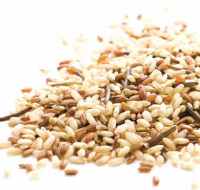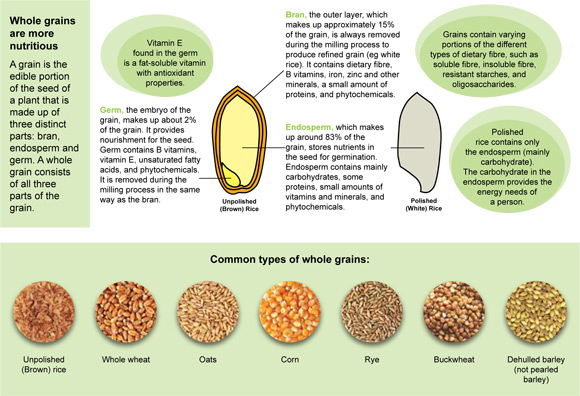Did you know that whole grains became a part of our diet over 10, 000 years ago when man first discovered agriculture? It is a main source of energy and a staple diet in many societies around the world. Grains in various forms can be found in different types of foods – rice, noodles, bread and many more.
Whole grains in its natural form are more nutritious. Not only is it rich in dietary fibre, vitamins and minerals but it also offers various health benefits. Refined grains, on the other hand, have been milled to remove the bran and germ from the grain, leaving only the endosperm. During the milling process, majority of the nutrients such as vitamins and dietary fibre in the bran and germ are stripped out.
Sadly, a many of us today prefer to consume polished or refined grains rather than whole grains products as refined grains have a finer texture and an improved shelf life.
Whole health benefits
The health benefits of whole grains have been recognised as early as in 4 B.C. It is associated with a lower risk of cardiovascular diseases, type 2 diabetes and certain cancers, and also help with bowel health and weight management!
-
Promotes bowel health
Wholegrain food products are high in dietary fibre which can help to regulate the movement of stools. Thus, bowel action becomes more frequent and helps to prevent constipation. They have also been associated with a decreased risk of developing colon cancer and diverticular disease. Some dietary fibres in whole grains (such as oligofructose and inulin) can function as prebiotics. They can help to promote the growth of beneficial bacteria in the gut while decreasing the levels of bad bacteria, thereby promoting gut health.
-
Protect against cancers
Recent research has shown that a high consumption of whole grains may help in reducing the risk of some cancers. The high antioxidant activity and protective effects of phytochemicals, vitamin E, trace minerals and high dietary fibre content in whole grains play an important role in protecting against these cancers.
-
Reduce cardiovascular diseases
Various studies have consistently shown that consumption of whole grains may contribute in reducing the risk of heart disease. This is probably due to the presence of various components in whole grains especially dietary fibre and some phytochemicals.
-
Helps with weight management
Some studies have indicated that consuming whole grains can reduce the risk of obesity and weight gain. The dietary fibre found in whole grains helps to promote a feeling of fullness, which reduces the amount of food eaten, and discourages overeating.
Type 2 Diabetes
Studies have shown that the risk to Type 2 diabetes can be reduced by regular consumption of whole grains. The beneficial effects may be due the dietary fibre which is known to be beneficial for weight management, an important aspect of diabetes control. In addition, dietary fibres are also known to improve blood glucose control in people with diabetes.
Now that you know the many health benefits of whole grains, try to incorporate them into your daily meals. Don’t forget to also eat a balanced and varied diet in moderation, avoid smoking and alcohol abuse, and last but not least, get your daily dose of some physical activity.








Comments